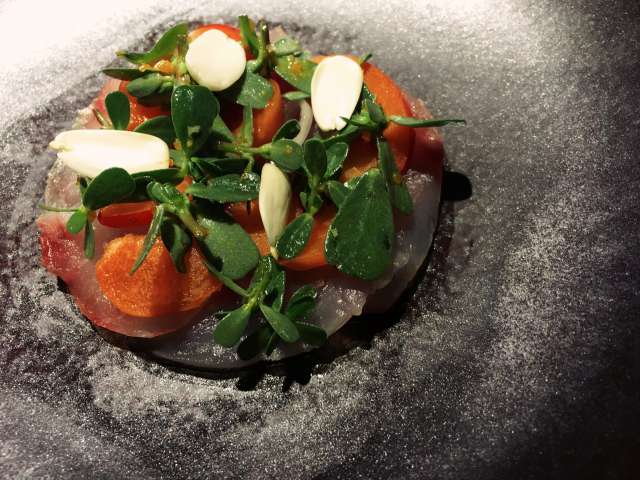Bread is important.
It’s the most fundamental of foods, loaded with symbolism, heavy with tradition, commanding its own rituals and reverence.
Often, you can take one look at the bread that a restaurant serves and work out precisely how good or bad your meal will be. If a kitchen cares not for the bread it serves, it may as well give up, because the game is lost.
I noticed this straight away at Saturne. It was hard not to. We had a table right next to a little bread station, a small alcove to house a thick chopping board, a knife, and a hulking pain de campagne, a great beast of a loaf, cracked and dark in crust, purposeful and elegant in crumb.
A waiter approached the loaf in the manner of a priest approaching an altar, taking the knife and turning the bread towards her. She paused for a long moment as if in prayer, knife balanced above crust, before tearing into the loaf in skillful, practiced sweeps, flipping the bread this way and that to produce substantial slices, to be loaded into linen lined baskets and delivered to tables with haste.
I could stop this here.
This is all you need to know about Saturne. That reverence, that care.
It’s a story for the ages.

I asked my brother a few weeks ago where we should eat in Paris. He knows the city’s restaurants well, and reeled off a few names.
“You really should go to Saturne, though. Believe me”.
So we believed him.
There’s no menu. Just seven or eight courses served in typically French style, slowly, over the course of an entire evening. What is a meal for if not to be enjoyed leisurely? The French understand this implicitly. Food is not to be rushed.
I’m not going to run through each and every course, and there were many.
There was a sashimi of white fish served with apricots, an asparagus tempura, a thick slice of duck breast, cooked delicately pink and served with rhubarb. There were nuggets of oyster in a clear bisque with cucumber and elderflowers, lobster with courgette cut and cooked several ways, with a hint of vinegar.
 There was a plate of cheese, shaved into thin strips that we doubted we’d finish, but did. There was a chocolate mousse, topped with a chocolate crumble, hiding roasted hazelnuts beneath. The wine list was long and exceptional, and the Joseph Anne Francoise we chose was an unfiltered, natural gem.
There was a plate of cheese, shaved into thin strips that we doubted we’d finish, but did. There was a chocolate mousse, topped with a chocolate crumble, hiding roasted hazelnuts beneath. The wine list was long and exceptional, and the Joseph Anne Francoise we chose was an unfiltered, natural gem.
Paris is a city of food. It’s reputation as the world’s gastronomic capital is long-standing, and well deserved. People say that it’s impossible to eat badly in Paris, which is of course, utter rubbish, but conversely, it’s easy to eat well. There are many, many great restaurants, and the standards are high.
You may pay handsomely for the privilege, as I did, but you may decide that certain meals, certain times and places, are worth the expense, and this, for me, is what Saturne gave.
A perfect collision of food and wine, service and space that started with a humble loaf of bread.
Superb and finessed cooking, wonderful, discreet service, a lovely, Scandinavian-style slightly minimalist dining room, and an exceptional wine list.
Well deserving of its Michelin star for the bread alone.

